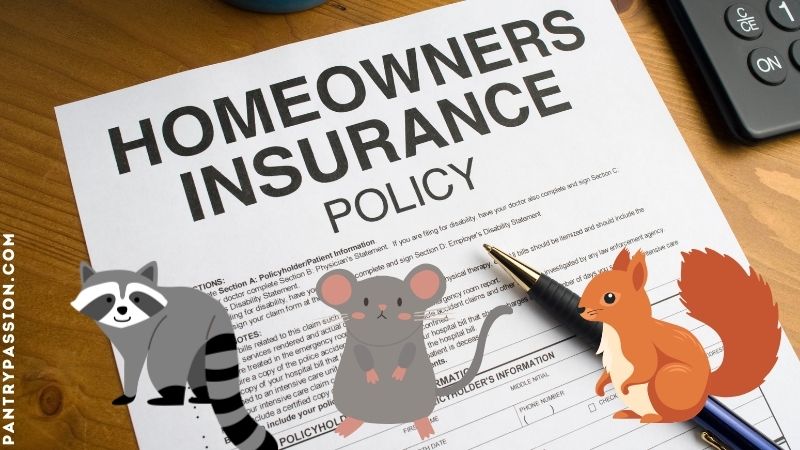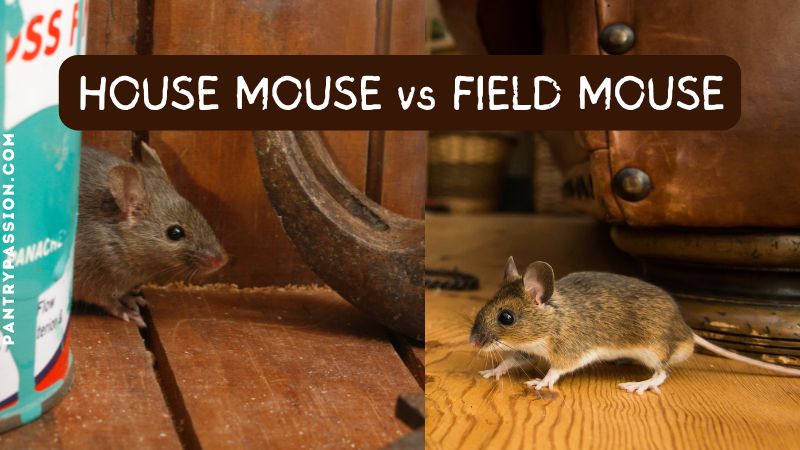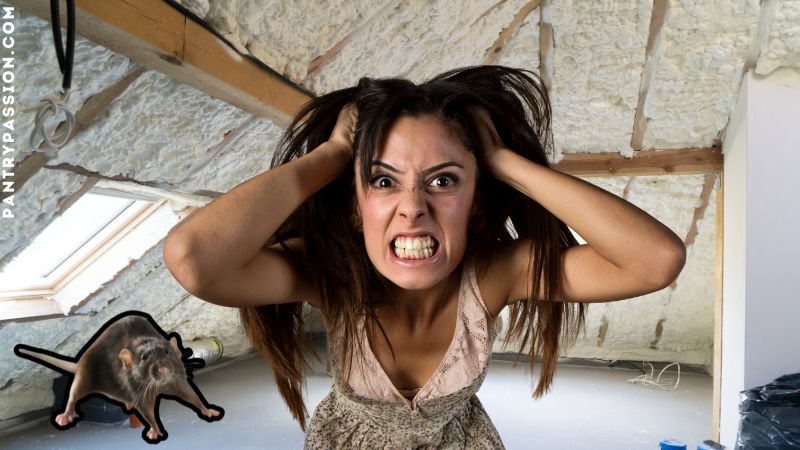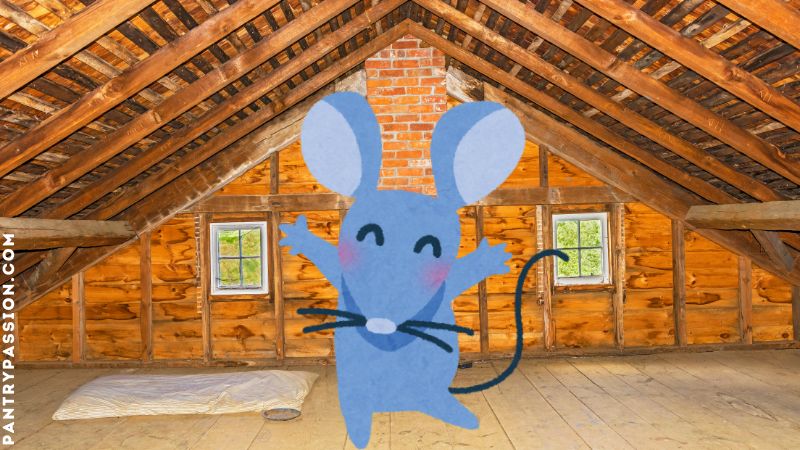The Best Fluffy Pancakes recipe you will fall in love with. Full of tips and tricks to help you make the best pancakes.

A series of articles on rodent control would not be complete without mentioning what to look for in mouse proofing services, and if your home insurance will pay for mouse damages. It’s a fair question, to be sure.
Let’s uncover some helpful information on these two topics.
DON’T MISS Pantry Passion’s Complete Article List for Mouse & Rat Prevention!
Table of Contents
- Pest Control vs Exterminator: Key Differences
- Evaluating Mouse Proofing Services
- What Are Typical Pest Exclusion Services?
- How Much Does Pest Exclusion Services Cost?
- Mouse-Proofing Warranty
- Is Pest Control Tax Deductible?
- Does Home Insurance Cover Pest Control and Damages?
- Will Homeowner’s Insurance Cover Racoon and Squirrel Damage?
- Will Insurance Pay for Wildlife Damage to Crops?
- Final Thoughts
Pest Control vs Exterminator: Key Differences
Before we dive into the details, let’s define the difference between “pest control” and “exterminator”. They actually represent two distinct approaches to managing unwanted pests.
Objective
- Exterminator: Focuses on immediate eradication of pests, often using strong chemical treatments. Think of them as the emergency responders for infestations.
- Pest Control: Aims for long-term prevention and management. They investigate the root causes and create sustainable solutions to keep pests away.
Methods
- Exterminator:
- Uses high-concentration pesticides.
- May employ fumigation, bombing, or broad spraying.
- Often requires residents to vacate the premises temporarily due to toxicity.
- Pest Control:
- Uses Integrated Pest Management (IPM), combining science, minimal chemicals, and prevention.
- Targets specific pests with eco-friendly treatments.
- Focuses on sealing entry points, reducing moisture, and educating homeowners.
Expertise
- Exterminator: Trained to eliminate pests quickly, but may not address why they appeared.
- Pest Control: Often has deeper knowledge of pest biology and behavior, allowing for tailored strategies that prevent recurrence.
Which Should You Choose?
- If you’re dealing with a severe infestation and need fast relief, an exterminator might be the right call.
- If you want to prevent future problems and protect your home long-term, pest control services are the better investment.
Evaluating Mouse Proofing Services
Choosing the right mouse-proofing company can make the difference between a temporary fix and long-term peace of mind. Here’s what to look for when evaluating your options:
- Structural Expertise
Look for companies that go beyond plugging holes and laying bait. The best ones inspect for foundational issues—like gaps in siding, roofline vulnerabilities, or buckling walls—that allow mice to enter in the first place. - Comprehensive Inspection
They should offer a detailed inspection of both interior and exterior areas, identifying all potential entry points and nesting zones. - Rodent-Proof Materials
Ask what materials they use to seal gaps. Steel wool, metal flashing, and concrete are far more effective than foam or caulk alone. - Long-Term Prevention Strategy
A good company doesn’t just remove mice—they prevent future infestations. That means sealing entry points, advising on food storage, and possibly installing deterrents like strobe lights or ultrasonic devices. - Eco-Conscious and Pet-Safe Solutions
If you have pets or prefer non-toxic methods, make sure they offer alternatives to poison baits, such as exclusion techniques and natural deterrents like peppermint oil (used cautiously). - Clear Communication & Transparency
They should explain their process, pricing, and timeline clearly. Bonus points if they educate you on how to maintain a rodent-free home afterward. They also should warranty their work. - Specialization in Rodent Control
Companies focus specifically on rodent-proofing rather than general pest control, which means they’re more likely to address root causes rather than symptoms.
Are you using the wrong type of peppermint oil? Check out Pantry Passion’s Guide to Peppermint Oil: Winning the Battle Against Mice.
Mouse Hunters indicates what triggers a higher rate of mouse infestations, including: problems with wall, roof, windows, and abandoned buildings or trash near your home.
What Are Typical Pest Exclusion Services?
An exclusion inspection from a reputable pest control company is an approach to keep pests out of your home by identifying and sealing off their entry points. This is what a pest control technician will do:
- Thorough inspection of your property—inside and out—to locate gaps, cracks, vents, or holes where pests like rodents, insects, or wildlife could enter.
- Sealing entry points using caulk, mesh, door sweeps, or other materials to block access.
- Foundation and attic checks to ensure pests aren’t sneaking in through less visible areas.
- Drainpipe and conduit protection, often with copper or metal mesh that allows airflow but blocks pests.
- Customized recommendations based on your home’s layout and local pest threats.
Why It Matters:
This is pest prevention at its finest, but no one can guarantee zero reinfestation. If you have a rat or mouse problem, or any pest for that matter, it’s important to get to the root of the issue: where they are coming into your home.
How Much Does Pest Exclusion Services Cost?
Mouse proofing, also known as pest exclusion, can get very expensive – to the tune of thousands of dollars. The higher range will cover experts going over every square inch of the exterior and interior of your home.
Factors that affect cost include location, what you are rodent proofing (deck vs house vs garage door) and what it takes to dig a trench and install barriers, materials (flashing or mesh). Don’t forget the overall shape of your house that can make it more complicated.
Some people might say the labor is just good old fashioned elbow grease and you can do it yourself. In addition, the company may offer a full package of services that include poison control and even rodent clean up.
Reddit user Wonderful-Equal5000 said this about rodent exclusion cost: “The typical rate is $15 per linear foot for 1/4” hardware cloth installation plus labor, trapping and monitoring fees.”
Bottom line, get more than one quote and an breakdown of exactly what the services include.
Mouse-Proofing Warranty
Mouse-proofing service warranties can vary quite a bit depending on the provider, but here’s a breakdown of what’s typical:
Common Warranty Durations
- 1 to 2 years: This is the most common range. Many companies offer a two-year warranty that covers re-entry due to workmanship or missed entry points.
- Lifetime guarantees: Some premium services go all in—offering lifetime warranties that cover sealing, cleanup, and even re-treatment if rodents return due to faults in their work. Rodent Stop is one company that does offer a lifetime guarantee.
- Some pest control companies offer a warranty extension (for a fee).
What These Warranties Usually Cover
- Workmanship: If rodents get back in due to poor sealing or missed gaps, the company will return to fix it.
- Materials: Some warranties include coverage for the materials used to seal entry points.
- Re-treatment: In stronger warranties, companies may offer free re-treatment if rodents breach the defenses.

Things to Watch For
- Exclusions: Warranties may not cover new damage caused by remodeling or natural wear unless inspected and re-approved.
- Transferability: Some warranties stick with the house even if you sell it—others don’t.
- Conditions: You might need to notify the company after renovations or repairs to keep the warranty valid.
If you’re shopping around for a service, it’s worth asking not just how long the warranty lasts, but what it actually protects. As always, a personal recommendation from a close friend or neighbor is always good.
Is Pest Control Tax Deductible?
It depends on why you’re hiring the exterminator. Consider the following scenarios:
✅ Tax-Deductible Scenarios:
- Business Property: If the pest control is for a property used in your business (like an office, warehouse, or storefront), it’s considered a business expense and is tax-deductible.
- Rental Property: If you’re a landlord, extermination costs for maintaining your rental units are typically deductible as operating expenses.
- Farm or Agricultural Use: Pest control on income-producing farmland also qualifies.
❌ Not Tax-Deductible:
- Personal Residence: If the exterminator is treating your own home and it’s not used to generate income (e.g., not a home office or rental), then it’s considered a personal expense and not deductible.
If you use part of your home for business (like a home office), you might be able to deduct a portion of the extermination cost.
Does Home Insurance Cover Pest Control and Damages?
You will have to check your comprehensive plan on your renter’s and home owner’s insurance. I came across information that mouse proofing companies will not mouse proof campers or RVs because there is too many potential entrances (sorry for that visual!).
Your insurance will almost certainly not cover mouse damage in your mobile home. Insurance providers classify rodent infestations and the damage they cause as a preventable issue resulting from a lack of maintenance, not a sudden or accidental event. The cost of extermination is also not covered.
I feel your frustration. Two years in a row, raccons have hit our grain combine up hard, damaging wires to the tune of $1800 in damages. Other people have been hit with wire damage to motorcycle, riding lawn mowers, and classic cars in storage. Once you realize insurance won’t pay for rodent damages, keeping them out of these vehicles should be your next step.

Potential exceptions:
In rare cases, your insurance might cover secondary damage that was directly caused by the rodents. For coverage to apply, the damage must be a result of a separate, covered peril, with the mice being the indirect cause. This might include:
- A fire caused by chewed wires: If mice chew through electrical wiring and cause a fire, the resulting fire and smoke damage would likely be covered.
- Water damage from a leak: If mice chew through a pipe, your insurance may cover the resulting water damage, but not the pipe repair itself.
- A covered event creating entry: If a storm damages your home and creates an opening that mice use to enter, some policies may cover the damage they cause, although this is less common.
Why coverage is unlikely:
- Preventable maintenance: Both standard homeowners and mobile home insurance policies consider pest infestations preventable. They expect you to take routine steps to keep rodents out of your home.
- Gradual damage: Mouse damage, such as chewed insulation or droppings, is seen as gradual wear and tear that happens over time, not a sudden, unexpected event that insurance is designed to cover.
- Exclusions for vermin: Nearly all policies specifically exclude damage caused by pests, rodents, and vermin.
Your next steps:
- Read your policy: To be certain, carefully review your mobile home insurance policy and look for exclusions related to “vermin,” “pests,” or “rodents”.
- Act quickly: As the damage is likely your responsibility, it is best to hire an exterminator and make repairs immediately to prevent the problem from worsening.
Will Homeowner’s Insurance Cover Racoon and Squirrel Damage?
Homeowners insurance may cover structural damage from raccoons and squirrels to your home’s roof or walls under your dwelling coverage, but it generally excludes damage to personal property and costs for animal removal. Because coverage varies by policy and is considered a preventable loss, damage from raccoons/squirrels is often excluded as a general rule. You should always review your specific homeowners policy or contact your insurer to understand your individual coverage details. [1, 2, 3, 4, 5]
What is typically covered [1, 2, 3]
- Structural damage: Your dwelling coverage might help pay for repairs to the actual structure of your house, such as the roof, walls, or attic, if a raccoon has damaged them.
What is typically not covered
- Personal property: Damage to belongings like electronics, furniture, or clothing stored in the area where the raccoon/squirrel caused damage is generally not covered. [1, 2]
- Animal removal: The cost of removing the raccoon/squirrel or other wild animals from your property is typically not covered. [4]
- Progressive damage: Damage from ongoing pest or animal infestations, such as rodents or termites, is often excluded. [5, 6]
- Vermin: Raccoons/squirrels are often considered vermin by insurance companies, and damage caused by them is frequently excluded under the policy. [7, 8]
What to do
- Read your policy: Check your homeowners insurance policy documents, including any endorsements or amendments, for specific details about animal damage. [2, 9]
- Contact your insurer: Reach out to your insurance agent or company to clarify what your policy covers in the event of raccoon/squirrel damage. [2, 9]
- Act proactively: Take steps to prevent raccoons/squirrel from accessing your home, such as securing entry points, to avoid damage and potential claim issues. [5, 10, 11]
Sources:
[1] https://www.allstate.com/resources/home-insurance/home-insurance-cover-animal-damage
[2] https://www.allstate.com/resources/home-insurance/prevent-raccoon-damage
[3] https://www.consumercoverage.com/blog/home-insurance/does-homeowners-insurance-cover-animal-damage
[4] https://www.progressive.com/answers/home-insurance-animal-damage/
[5] https://www.bankrate.com/insurance/homeowners-insurance/animal-damage/
[6] https://www.wawanesa.com/us/blog/does-homeowners-insurance-cover-wild-animal-damage
[7] https://www.policygenius.com/homeowners-insurance/does-home-insurance-cover-animal-damage/
[8] https://m.youtube.com/watch?v=a6TpUIA-Lxw
[9] https://www.amica.com/en/resources/home/coverage/does-homeowners-insurance-cover-animal-damage.html
[10] https://getsmartratsolutions.com/will-homeowners-insurance-pay-for-raccoon-damage/
Will Insurance Pay for Wildlife Damage to Crops?
As a farmwife, I know a thing or two about this. Personally, as frustrating as the damage is to our crops, we end up absorbing the loss of profits from damage.
Federal crop insurance may cover raccoon, wild turkey, and deer damage to crops under wildlife damage provisions, but this depends on your specific policy and the circumstances of the damage. You’ll need to review your policy documents carefully or contact your crop insurance agent to determine if your policy includes coverage for wild animal damage to your crops. [1, 2, 3, 4]
Factors influencing coverage:
- Policy type: Different types of federal crop insurance exist, and coverage for wildlife damage varies by policy. [1, 3]
- Definition of “wildlife damage”: Your policy may define what counts as wildlife damage and which animals are covered. [1, 3, 5]
- Preventability: Some damage is considered preventable, and insurance may not cover it if the farmer didn’t take reasonable steps to prevent it. [6, 7]
- Sudden and accidental damage: Crop insurance typically covers sudden and accidental events, so damage that happens over time might not be covered. [8, 9]
- Contact your crop insurance agent: They can explain the specific provisions of your policy regarding wildlife damage.
- Review your policy: Read your policy documents to understand your coverage and any exclusions related to wildlife damage.
- Document the damage: If you discover wildlife damage, document it with photos or videos, as this may be needed when filing a claim.
Sources:
[1] https://www.irmi.com/term/insurance-definitions/federal-crop-insurance
[2] https://www.hawkeye.ca/blog/does-homeowners-insurance-cover-raccoon-damage
[3] https://www.trutechinc.com/homeowners-insurance-wildlife-damage/
[4] https://www.crittercontrol.com/wildlife/raccoons/raccoon-damage/
[5] https://www.thezebra.com/homeowners-insurance/coverage/animal-damage-coverage/
[6] https://www.progressive.com/answers/home-insurance-animal-damage/
[7] https://www.dicklawfirm.com/blog/2023/january/will-your-home-insurance-cover-wildlife-damage-/
[8] https://www.lloydsbank.com/insurance/home-insurance/help-and-guidance/wear-and-tear.html
[9] https://www.fmh.com/policyholders/organic-practice-guidelines
Final Thoughts
There are times that a mouse-proofing service is worth it – you might even pick up great tips for keeping mice out of your home. Unfortunately, it has to come out of your own pocket.
As we learned, in most cases, homeowner’s and apartment insurance will not pay out for pest damages or mouse-proofing.
The good thing? I’ve got plenty of tips on my pantry blog to DIY your mouse control efforts!











